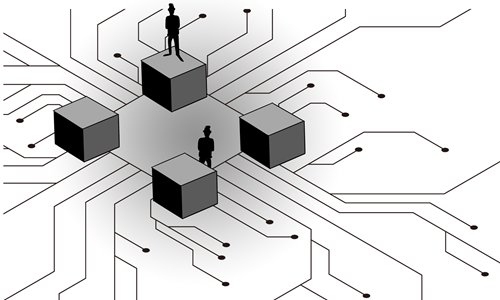SOURCE / INDUSTRIES
China's central bank issues rules for blockchain uses in financial industry
Central bank issues rules for blockchain uses in financial industry

People walk by a sign of Blockchain Summit during the Mobile World Congress Shanghai 2019 in June. Photo: IC
The People's Bank of China (PBC), the central bank, has issued documents and evaluation rules regarding the application of blockchain in financial institutions including banks, security companies and insurance firms, industry insiders confirmed with the Global Times Wednesday.
It is the first time China's central bank has issued detailed rules regulating the application of blockchain technology.
The document requires financial institutions to evaluate blockchain on three major fronts including technology, performance and security. Evaluations will judge whether or not the blockchain technological application system can ensure the safe and stable operations of the relevant financial infrastructure, the notice read.
It also gives detailed technological indicators, assessment methods and standards regarding product design, software development and system operation.
According to the notice, financial institutions are required to set up and improve risk mechanisms for blockchain application, and to conduct external safety assessments regularly to promote the application of blockchain. Financial institutions are required to complete filing work for blockchain application.
It urged industry associations to strengthen management in the application of blockchain technology, and to set up internal mechanisms for self-inspection and information sharing.
The rules issued by the central bank apply to banks, brokers, fund companies, futures companies, private investment funds, Union Pay and non-bank payment institutions.
Shentu Qingchun, CEO of Shenzhen-based blockchain company BankLedger, told the Global Times Wednesday that the new rule is of great significance as it sets a legal basis for financial institutions on how they can explore the potential of blockchain technology without "crossing the bottom line."
Wang Peng, assistant professor of GaoLing School of Artificial Intelligence at Renmin University, said that the timing of the guideline is worth taking note of as Chinese policymakers have been doing pilot tests of a sovereign digital currency in selected cities in the country this year.
"The guideline echoes with China's digital currency plan amid global race," Wang told the Global Times.
A number of financial institutions, including the Agricultural Bank of China and the Industrial and Commercial Bank of China, have in the last two years been scaling up efforts to apply blockchain technology to aid their financial services such as internet financing and asset management storage.
According to the notice, blockchain is defined as an encrypted technology that requires mutual maintenance and could achieve the consistency, tamper-proofing and non-repudiation of data. Other functions of blockchain such as decentralization and token have not been mentioned in the document.




